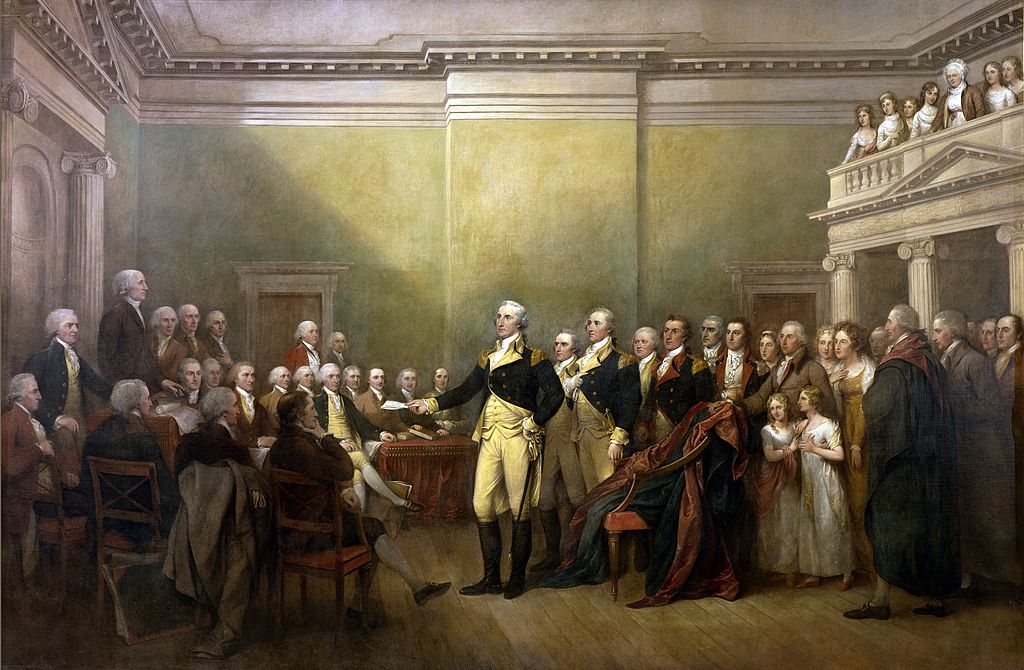Four John Trumbull paintings hang in the Rotunda of the U.S. Capitol: one of the signing of the Declaration of Independence, two depicting British surrenders at great American victories of the Revolutionary War, and one titled General George Washington Resigning His Commission. The art is well-chosen, as the act commemorated in the last painting is as important as what happened at Independence Hall, Saratoga, and Yorktown. In it, Washington made clear that he harbored no autocratic ambitions, that the army he commanded remained subject to civilian democratic control, and that it would play no role in domestic politics.
The painting is also relevant to our current moment. Former President Donald Trump has been charged with four felonies for his efforts to overturn the results of the 2020 election. As a veteran, my blood ran cold reading two particular passages in special counsel Jack Smith’s indictment. They suggest that part of the former president and his co-conspirators’ autocratic plan to remain in power, despite knowing that they lost the 2020 election, was to make the U.S. military choose between subservience to civilian control or refusing to undertake an anti-democratic domestic political role.
In the first passage, it appears that when a deputy White House counsel warned Assistant Attorney General Jeffrey Clark that if Trump remained in office despite the absence of any evidence of outcome-determinative election fraud, riots would break out in U.S. cities, Clark responded, “That’s why there’s an Insurrection Act.” In the second, the indictment reports that when similarly warned of the risk of riots, Trump’s outside counsel John Eastman responded that there were points in American history when violence was necessary to protect the republic.
At the time of these statements, Trump planned to name Clark acting attorney general—the nation’s chief law enforcement officer—and Eastman had authored a memorandum advancing an argument, which he privately admitted was without legal merit, that Vice President Mike Pence could unilaterally reject slates of electors pledged to Joe Biden.
Taken together, these statements suggest that Clark and Eastman sought to have the vice president nullify the results of the 2020 election in bad faith, anticipated that this unconstitutional act might lead to widespread unrest, and that they planned for the commander-in-chief to order federal troops (or federalized National Guardsmen) to put down those riots. The armed services were to be told to use force against Americans to keep Trump in office, despite the objective fact, as established in more than 60 judicial proceedings, that Biden won the 2020 election.
The Insurrection Act of 1807, as amended, provides that a president may, after calling for “insurgents” to disperse, use the military to suppress violence that obstructs the execution of federal laws or so hinders the execution of any laws as to deprive citizens of their rights. Clark and Eastman anticipated then-President Trump doing exactly this—using troops against crowds of fellow citizens that, as during the June 2020 disorder after the murder of George Floyd, would inevitably include arsonists, vandals, and looters mixed in with a majority of peaceful protesters.
Imagine the scenario: Understandably angry crowds facing young soldiers with little training in responding to civil unrest. Tragic loss of life would occur, and on a scale beyond that of the Boston Massacre of 1770, the Pullman strike of 1894 (during which President Grover Cleveland dispatched federal troops under the Sherman Antitrust Act), or the Kent State shootings of 1970. Events would deteriorate from there.
The presidential demand anticipated by Clark and Eastman would place military leaders in the excruciating position of responding to an order facially legal under relevant statutes, but given for a purpose inimical to the ideals of the framers of the Constitution to which they swore an oath. Generals would be forced to choose whether to abandon an unbroken tradition of American military obedience to civilian control, or turn their guns on civilians to facilitate a losing candidate remaining in the White House beyond Inauguration Day.
The foreseeable consequences of Clark, Eastman, and Trump’s criminal plot would have been profound for the military and the nation. I suspect the generals would have reluctantly chosen the first of the two bad options they faced. In either case, the republic would still suffer grave damage. If convicted of this conspiracy, that potential harm should be taken into account in the former president’s sentencing.






Please note that we at The Dispatch hold ourselves, our work, and our commenters to a higher standard than other places on the internet. We welcome comments that foster genuine debate or discussion—including comments critical of us or our work—but responses that include ad hominem attacks on fellow Dispatch members or are intended to stoke fear and anger may be moderated.
With your membership, you only have the ability to comment on The Morning Dispatch articles. Consider upgrading to join the conversation everywhere.